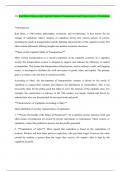### Karl Marx's Ideas on the Capitalist Mode of Transportation and Characteristics of Capitalism
**Introduction
Karl Marx, a 19th-century philosopher, economist, and revolutionary, is best known for his
critique of capitalism. Marx's analysis of capitalism delves into various aspects of society,
including the mode of transportation and the defining characteristics of the capitalist system. His
ideas remain influential, offering insights into modern economic structures.
**Marx on the Capitalist Mode of Transportation**
Marx viewed transportation as a crucial component of the capitalist economy. In a capitalist
society, the transportation system is designed to support and enhance the efficiency of capital
accumulation. This means that transportation infrastructure, such as railways, roads, and shipping
routes, is developed to facilitate the swift movement of goods, labor, and capital. The primary
goal is to reduce costs and time to maximize profits.
According to Marx, the development of transportation systems is driven by the needs of
capitalists to expand their markets and improve the distribution of commodities. This is not
necessarily done for the public good but rather to serve the interests of the capitalist class. For
example, the construction of railways in the 19th century was largely funded and driven by
industrialists who saw the potential for increased trade and profit.
**Characteristics of Capitalism According to Marx**
Marx identified several key characteristics of capitalism:
1. **Private Ownership of the Means of Production**: In a capitalist system, factories, land, and
other means of production are owned by private individuals or corporations. These owners, or
capitalists, control the production process and the profits generated.
2. **Exploitation of Labor**: Marx argued that capitalism is based on the exploitation of
workers. Workers sell their labor power to capitalists, who pay them wages. However, the value
created by workers is greater than the wages they receive; the surplus value is kept by the
capitalists as profit.
,4. **Competition and Accumulation**: Capitalism is characterized by competition among
capitalists to accumulate more capital. This drives innovation and efficiency but also leads to
economic inequalities and crises.
5. **Alienation**: Workers in a capitalist system often experience alienation. They are separated
from the products of their labor, the production process, their fellow workers, and their own
potential. This alienation is a result of their lack of control over their work and the exploitation
they face.
**Applicability of Marx's Views to the Modern Economic System**
Marx's critique of capitalism remains relevant in analyzing today's economic systems. Modern
capitalism still features private ownership, exploitation of labor, and alienation. For instance,
multinational corporations own vast resources and means of production, often leading to
significant profit margins for owners while workers receive relatively low wages.
The issue of alienation persists, as many workers in different economies feel disconnected from
their work, contributing to job dissatisfaction and mental health issues. Moreover, the rapid
development of technology and globalization has led to intensified competition and
accumulation, benefiting a small elite while increasing economic inequality.
However, there are also differences. Modern economies have seen the rise of regulations, social
safety nets, and labor rights that aim to reduce some of the harshest impacts of capitalism.
Furthermore, new economic models, such as social entrepreneurship and cooperatives, seek to
address some of the systemic issues Marx highlighted.
**Conclusion**
Karl Marx's analysis of capitalism, including his views on the transportation system and the
characteristics of capitalism, provides a critical framework for understanding the dynamics of
modern economies. While some aspects of his critique remain highly relevant, the evolution of
economic systems and the introduction of regulatory measures show a complex interplay
between Marxist theory and different economic practices. Understanding these ideas helps in
addressing ongoing economic challenges and striving towards more equitable systems.
, ### Karl Marx's Theory of the Division of Labour and Alienation: Applicability to Modern Day
Systems
**Introduction**
Karl Marx, a prominent philosopher, and economist explored how the division of labor under
capitalism leads to alienation. His theory highlights the ways in which workers become
disconnected from their work, the products they create, and their own humanity. Understanding
Marx's ideas about alienation and the division of labor can offer valuable insights into the
modern economic and work environments.
**Marx's Theory of the Division of Labour**
In a capitalist society, the division of labor refers to the specialization of tasks within the
production process. This means that instead of one person creating an entire product, different
workers perform specific tasks to contribute to the final product. While this increases efficiency
and productivity, Marx argued that it also leads to significant negative consequences for workers.
The division of labor in capitalism means that workers perform repetitive, monotonous tasks.
They do not see the product of their work and have little connection to the overall production
process. This specialization can make work feel meaningless and contribute to a sense of
powerlessness among workers.
**Types of Alienation**
Marx identified four types of alienation that result from the capitalist mode of production:
1. **Alienation from the Product of Labor**: Workers do not own or control the products they
create. These products belong to the capitalists who sell them for profit. This separation makes
workers feel disconnected from their work.
2. **Alienation from the Process of Labor**: Workers have little control over the work process
itself. They must follow strict procedures and often perform repetitive tasks, leading to a lack of
fulfillment and creativity.




